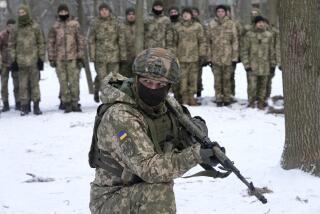Yeltsin Pledges to Help Keep Peace in Bosnia
- Share via
MOSCOW — Russian President Boris N. Yeltsin assured Secretary of State Warren Christopher on Wednesday that Russia would commit its troops to a NATO-led force to police the Bosnian peace plan, should it eventually be approved, or join the United States in considering “new and tougher measures” if the accord fails.
A peacekeeping force for Bosnia, which Washington had already agreed to join, would mark the first time since the end of World War II that the former Cold War enemies had sent ground troops as allies into possible combat.
Russia already has about 200 troops in the existing U.N. peacekeeping force in the former Yugoslav republics. But if the Bosnian peace plan, signed Sunday in Athens, ever takes effect, a much larger force of as many as 75,000 troops, including about 12,000 Americans, would be required to police the agreement.
Although the new force would be authorized by the United Nations, the North Atlantic Treaty Organization is expected to take the military lead, a situation that could have the unprecedented result of placing Russian troops under NATO command.
Yeltsin’s remarks came before the Bosnian Serb parliament refused to approve the peace plan, handing it over to a referendum.
In a joint statement issued after Christopher completed almost five hours of talks with Russian officials, including a little more than an hour with Yeltsin, the two countries said: “The United States and Russia are prepared to commit appropriate military forces of their own to assist in these peacekeeping endeavors.”
There was no indication of how many troops Russia would contribute or how the economically pressed country would pay for them.
But U.S. officials said they were even more heartened by Yeltsin’s promise to consider harsh new steps against the Bosnian Serbs if they gave a final rejection to the peace agreement hammered out by international mediators Cyrus R. Vance and Lord Owen--or if they failed to live up to the terms of the pact.
Russia, a traditional ally of Serbia, abstained when the U.N. Security Council tightened economic sanctions last month, and Yeltsin has been under heavy pressure from his conservative and nationalist domestic political opposition to resist further Western action against the Serbs.
“If the Vance-Owen plan is not accepted and implemented, the United States and Russia will immediately resume their discussion on new and tougher measures. No measures are prejudged or excluded from consideration,” the joint statement said.
Although a senior State Department official said Yeltsin declined even to talk about President Clinton’s unraveling plan for punitive military action, the Russian president said he is ready to consider the Clinton proposals as well as other measures if the Serbs openly defied the peace. The official said the consultations would be held “very soon and at a high level.”
According to the Russian news agency Interfax, Yeltsin told Christopher that Bosnian Serb leader “Radovan Karadzic signed the Owen-Vance (plan) so quickly that the question of military intervention in the conflict now is not on.”
Another State Department official said that Yeltsin offered more support to U.S. objectives than did traditional allies Britain and France, where Christopher held consultations earlier this week.
The joint statement was intentionally vague about the nature of the new measures, but Russian Foreign Minister Andrei A. Kozyrev insisted that the Serbs should take no comfort from the ambiguity.
“In the Christian tradition, Orthodox or Catholic or whatever, it is rare that hell is described in specific terms,” Kozyrev said, speaking in English. “It is even more threatening and more meaningful when hell is discussed as something which will follow sins.”
Christopher conceded Tuesday that Clinton’s military plan--believed to call for air strikes on Serbian artillery and other military positions combined with a relaxation of the U.N. arms embargo to permit the shipment of weapons to the outgunned Bosnian Muslims--will have to be revised to take account of questions and reservations raised by NATO allies Britain, France, Spain and Greece.
Perhaps for this reason, U.S. officials expressed no objections when Yeltsin added his name to the list of potential allies who insist on additional consultations.
Yeltsin appeared relaxed and confident after his victory in last month’s Russian referendum. A U.S. official quoted Christopher as saying the Russian president appears to be “at the top of his game.”
The official, who attended the meeting, said Yeltsin noted that Sunday is the 49th anniversary of the allied victory over Nazi Germany. He said the Bosnia peacekeeping force would give the United States and Russia an alliance “that would be deeper and broader” than the World War II coalition.
Although at a far lower scale than during World War II, allied troops in Bosnia clearly would face a dangerous situation that could lead to intense combat.
Kozyrev told reporters that Russian soldiers would be used to guard a land corridor linking territories peopled by ethnic Serbs in Bosnia with Serbia itself.
“I am glad to be able to reiterate the commitment of Russia to provide necessary troops and monitors to be sure the corridor is safeguarded,” Kozyrev said.
In Brussels, Owen said the troops must be authorized to use force against any Bosnian factions that violate the pact’s provisions.
“They must go in with the capacity to take on forces that may want to subvert the plan,” Owen said, according to the Associated Press.
A group of visiting U.S. senators, in Moscow to check progress on the arms control front, hailed the Russian-American statement as a sign of the new relationship between the Cold War adversaries.
Times staff writer John-Thor Dahlburg contributed to this report.
* CLINTON SEES LAWMAKERS: He avoids stand on seeking OK for sending GIs to Bosnia. A10
More to Read
Sign up for Essential California
The most important California stories and recommendations in your inbox every morning.
You may occasionally receive promotional content from the Los Angeles Times.










